Events Archive
Midd.Data Events
May 4, 2022
Damascus Kafumbe, Music: Towards a Decolonial Pedagogy: African Music and Dance Performance in the American Academy
Lightning Lunch (Zoom)
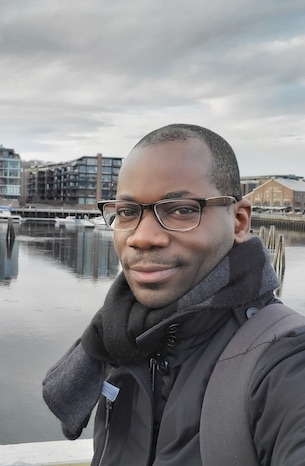
When students enroll in world music performance courses, they typically enter them carrying certain stereotypes, biases, and expectations that distort the learning process. Perhaps the most common of such misconceptions is that all musical knowledge and skills can and should be transmitted primarily through Euro-American pedagogical methods such as written notation, individualized instruction, and codified theory. This presentation makes a case for musical pedagogy that utilizes the cultural principles that inform the artistic styles being taught as frameworks for instruction. Drawing on two decades of experience teaching African music and dance performance in the American academy, the talk demonstrates this approach’s efficacy through recorded performances, exemplary quotes from student reflections, and my analysis of these materials. The presentation is part of a larger project (teaching guide) that contributes to ongoing discourses about effective pedagogy.
Damascus Kafumbe is a performing ethnomusicologist, teacher, multi-instrumentalist, dancer, composer, and instrument technician from Uganda. Since joining the Middlebury music faculty in 2011, Professor Kafumbe has developed and taught several courses in ethnomusicology and world music, directed the Middlebury African Music and Dance Ensemble, and maintained the College’s Ugandan musical instrument collection. Professor Kafumbe’s research interests span diverse fields, including African studies, ethnomusicology, performance, history, politics, ritual, and social organization.
PAST EVENTS
Lightning Lunch (Zoom)
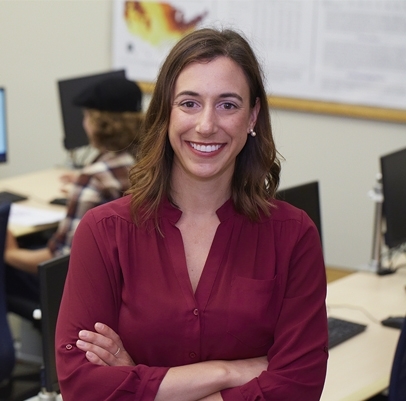
At the onset of the pandemic, Professor Wolcott worked with co-author Marianna Kudlyak (Federal Reserve Bank of San Francisco) and Middlebury students Lachlan Pinney ’21.5 and Claire Moy ’22 to assemble a dataset of high-frequency state-level layoff data from the Federal Worker Adjustment and Retraining Notification Act. Professor Wolcott will discuss the ways in which they used this data to document layoffs in the United States which were predominantly temporary as well as more recent work in which they study the effect of local stay-at-home orders in March-April 2020 on mass layoffs.
Erin Wolcott joined the Middlebury Department of Economics as an Assistant Professor in the fall of 2017. Her research is in macroeconomics, labor economics, and international finance. She teaches courses on macroeconomics, globalization, and inequality.
March 8, 2022
Million Dollar Hoods: Mapping the Cost of Mass Incarceration, an Organization of American Historians Distinguished Lecture
Guest speaker (Zoom)
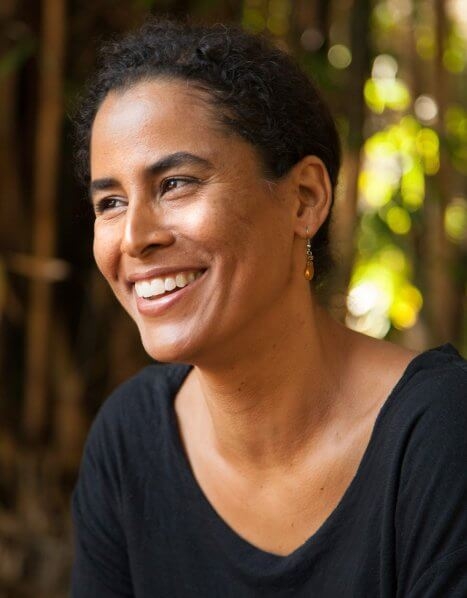
OAH Distinguished Lecturer Kelly Lytle Hernández: Mapping the Cost of Mass Incarceration by Kelly Lytle Hernandez
Los Angeles County operates the largest jail system in the United States, which incarcerates more people than any nation on Earth. Kelly Lytle Hernández will join us to provide an introduction to Million Dollar Hoods, a university-based, community-driven research project that maps the fiscal and human cost of mass incarceration in Los Angeles. This event is co-sponsored by midd.data and Black Studies.
Kelly Lytle Hernandez, Organization of American Historians Distinguished Lecturer. Prof. Hernandez is Faculty Director of Million Dollar Hoods, and Professor of History, African American Studies, and Urban Planning at UCLA, where she is also the Director of the Ralph J. Bunche Center for African American Studies. One of the nation’s leading experts on race, immigration, and mass incarceration, she is the author of the award-winning books, Migra! A History of the U.S. Border Patrol (University of California Press, 2010), and City of Inmates: Conquest, Rebellion, and the Rise of Human Caging in Los Angeles (University of North Carolina Press, 2017). In 2019, Professor Lytle Hernandez was named a MacArthur “Genius” Fellow.
March 2, 2022
Anthony Castelletto: The Digital Ocean: Data: Analytics at The Center for the Blue Economy
Lightning Lunch (Zoom)

This talk will describe how the Center for the Blue Economy uses data to conduct translational work in environmental economics. The Center translates geophysical data into economic consequences to guide leaders on how to cope with the ocean and coastal effects of climate change and to promote sustainable development of ocean resources.
Anthony Castelletto is the Center for the Blue Economy’s Research Associate. He manages the center’s research projects under the direction of Dr. Charles Colgan, Director of Research. Anthony comes to the Center following a career in Computer and Information Science. Working in that industry, he built networked information systems and managed scientific data supply chains in Physics, Atmospheric Science, and Linguistics. He went into Public Policy and Economics to help address the problem of climate change. He uses his skills in the sciences and data management to deliver timely research to preserve the health of the environment and promote sustainability.
February 25, 2022
Hang Du: Linguistic development during Study Abroad: Research on a corpus of spoken learner Chinese
Lightning Lunch (Zoom)
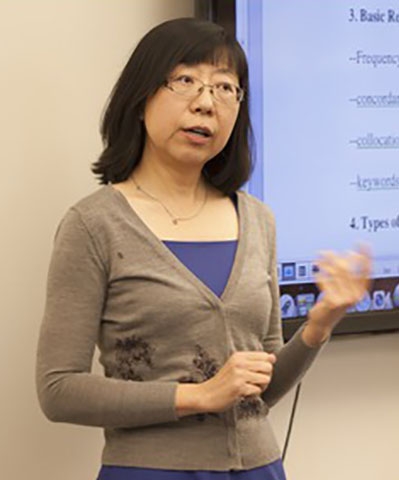
Research investigating the effect of study abroad on the development of grammatical accuracy has produced conflicting results. Using corpus linguistics research methods—yet to be used more extensively in Second Language Acquisition research—this study investigated students’ acquisition of grammatical accuracy and lexical development during study abroad in China on data from a subgroup of 62 students in a corpus of over one million characters of transcribed spoken learner Chinese produced by 83 American college students who studied in China for a semester or academic year. Results show that the students made significant progress in their accuracy of using the perfective aspect marker le; they used more sophisticated vocabulary; and for the two words that mean “but” in English, they shifted from using the less frequent word kěshì to the more frequent dànshì, towards the native norm. The significance of such research and pedagogical implications will be discussed.
Hang Du joined Middlebury’s Chinese Department in 2004 and also is active in Middlebury’s program in linguistics. Her language teaching includes over 15 years’ experience teaching beginning Chinese, second-year Chinese, and senior seminars about contemporary Chinese culture and society for students who have returned from study abroad in China, using all authentic material written/produced by and for the Chinese people. Her main research area is the acquisition of Chinese as a second language.
January 26, 2022
Shawna Shapiro: Building a Community of Practice around Critical Language Awareness Pedagogy
Lightning Lunch (Zoom)
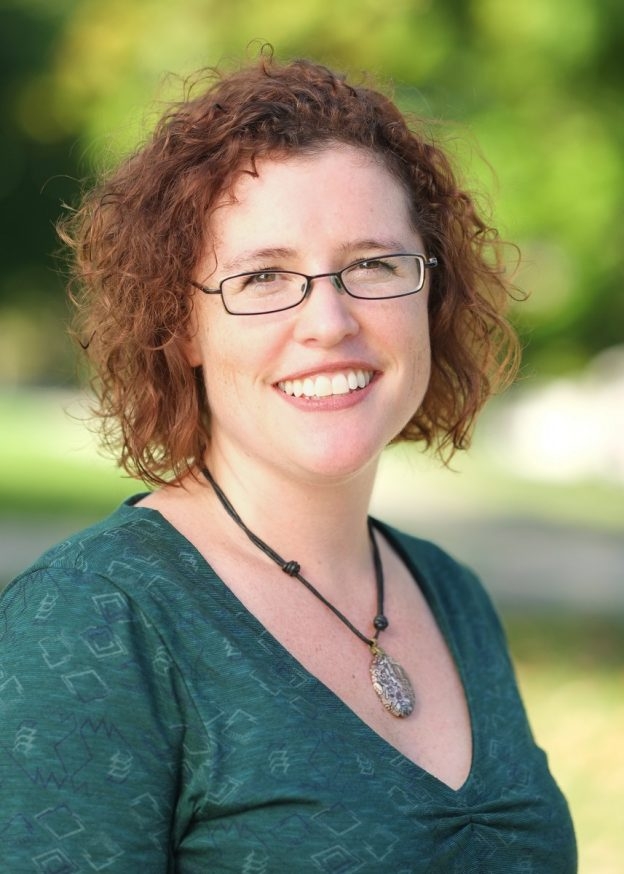
Professor Shapiro will provide a brief overview of Critical Language Awareness (CLA), an approach to writing/literacy that explores intersections of language, identity, power, and privilege. She will then share how she have worked with DLINQ to develop an online resource hub (https://cla.middcreate.net/) for teachers and researchers who are interested in this approach. Finally, she will discuss her long-term vision for the hub, and for CLA as a means of bridging geographic, institutional, and disciplinary contexts in the teaching of writing.
Shawna Shapiro is an associate professor of writing and linguistics at Middlebury College. Her research focuses on the transition to higher education for immigrant and refugee students, and on innovative approaches to working with multilingual/L2 writers. Her work has appeared in many peer-reviewed journals, and she has authored or edited two books: Fostering International Student Success in Higher Education (2014) and Educating Refugee-background Students: Critical Issues and Dynamic Contexts. More information is on her online resource hub can be found here: (https://cla.middcreate.net/)
December 10, 2021
midd.data lighting talk: Using Digital Humanities to Recover Lost Histories of Slavery
Zoom
Using Digital Humanities to Recover Lost Histories of Slavery
Elsa Mendoza, History Department
Digital humanities tools such as databases and digitization have offered new insights into the histories of enslaved people. These digital archives raise crucial questions about the use and access of data, the representation of race and lived experiences in databases, and the power of these tools in humanizing and dehumanizing historical narratives. This talk will explore how digital humanities can increase access to stories forgotten in the archive and the issues in replicating violent and exclusionary documents in digital form.
Bio: Elsa is an Assistant Professor in the History Department at Middlebury College and the associate curator of the Georgetown Slavery Archive. Her research focuses on the lives of people enslaved at universities as well as the financial connections between slavery and higher education in the United States. She is the co-editor of Facing Georgetown’s History: A Reader on Slavery, Memory, and Reconciliation (Georgetown University Press, 2021).
Elsa received her PhD in History from Georgetown University. She is a former Fulbright-Garcia Robles Fellow, and in the spring of 2022, she will be a fellow in Harvard University’s Charles Warren Center for Studies in American History.
Zoom

Liberal arts for an information age
The Middlebury Initiative for Data and Digital Methods (midd.data) is pleased to present “Liberal Arts for an Information Age”, a fireside chat with Eric Schmidt, Co-founder, Schmidt Futures, who served as Google’s Chief Executive Officer and Chairman from 2001 to 2011, Executive Chairman from 2011 to 2018, and most recently as Technical Advisor. The chat will take place via Zoom on Tuesday, November 30, 2021, from 7:00-8:00 PM Eastern.
In this webinar, moderated by Professor Caitlin Myers, John G. McCullough Professor of Economics and co-Director of midd.data, Mr. Schmidt and Professor Myers will discuss key questions related to how liberal arts colleges and similar institutions might adapt to a rapidly changing world marked by the rise of big data, big computing, and big tech.
Guests are encouraged to submit their questions for the conversation ahead of time via this form.
This event is open to all members of the Middlebury Community and to the public.
October 22, 2021
midd.data lighting talk: Optimizing spirits distribution in Bangkok with data-driven marketing analytics
Zoom
Optimizing spirits distribution in Bangkok with data-driven marketing analytics
Amitiva Biswas, Professor of the Practice
Spirits, or “hard liquor”, is a 500 billion USD industry globally and a 20 billion USD industry in Thailand, comprising almost 4% of total GDP there. The premium spirits market is a global oligopoly dominated by 3 major brand owners: Diageo (Johnnie Walker, Smirnoff, others), Pernod Ricard (Chivas, Absolut, others), and Bacardi (Bacardi rum, Dewars, Grey Goose, others) which together command 50% global market share.
In 2019, Bacardi selected Thailand to test a data-driven approach to strategy and engagement - could quantitative analysis help select the optimal venues, terms, and conditions for partnerships?
In this project, we recruited 10 survey-takers to collect about 100 data points from 500 different venues using a custom-designed survey instrument and mobile app. We developed several metrics and algorithms designed to convert these data into actionable strategic and executional recommendations for optimizing marketing.
This talk will give a brief overview of the industry, review metric and algorithm development, the data gathering process, and findings from the project.
October 1, 2021
midd.data lighting talk: Open-Source Intelligence and Operational Security for Researching the Far Right
Zoom
midd.data lighting talk: Open-Source Intelligence and Operational Security for Researching the Far Right
Alex Newhouse, Center on Terrorism, Extremism, and Counterterrorism, Middlebury Institute
Data analysis techniques have given us unprecedented insight into extremist methods of radicalization and organization. Social network analysis (SNA), machine learning, and large-scale data scraping tools in particular have allowed open-source intelligence (OSINT) analysts to better understand the threat posed by extremists. However, operational security is an essential part of applied data analysis and OSINT, and it is vital that security best practices are taught alongside data skills.
Alex’s Bio
Alex is the deputy director of CTEC, where he focuses on using data-driven methods to analyze extremism, terrorism, conspiracy theories, and disinformation. He is an expert in anti-government and far-right extremism, including accelerationism, sovereign citizens, the Christian Identity movement, QAnon, and white supremacy. At CTEC, Alex focuses on projects that used mixed-methods approaches to assist both private and public entities in responding to the threats posed by extremist movements. He holds a BA from Middlebury College, an MA from the Middlebury Institute, and an MS from Georgia Tech.
May 20, 2021
Sayaka Abe (Japanese Studies), David Allen (Biology), Carrie Anderson (History of Art and Architecture), Alex Lyford (Mathematics), Caitlin Myers (Economics): Data Science Across Disciplines: A Teaching Adventure in Five Acts
This year five faculty colleagues from Math, Art History, Biology, Economics, and Japanese designed and piloted a new winter-term course blending a traditional introduction to data science with immersive project-based applications across four disciplines. Students with no prior data science experience spent their mornings learning how to use the statistical software package R to wrangle and extract meaning from data, and their afternoons critically applying these skills to research projects on topics ranging from seventeenth-century Dutch art to tick-borne disease to Japanese pop culture to abortion policy. Join the faculty and students from this course to hear about their experiences and findings, and to discuss broader implications for providing all students equitable and inspiring access to data and digital tools.
Zoom Meeting
Digital humanists have no particular problem talking about data. We use it, trade it, and think about it constantly. Many “traditional” humanists, though, bristle at the notion that their sources constitute “data.” And yet humanists work with evidence, and they speak of proving their claims. So is this just a problem of terminology? I’ll argue in this talk that our data trouble is more substantial than we’ve acknowledged. The term “data” seems alien to the humanities not just because humanists aren’t used to computers, but because it exposes some very real differences in the way humanists and scholars from some other fields conceive of the work they do. In this talk, I’ll outline the specific points of tension between the notion of data and the ways that humanists work with sources, and I’ll explain why I think this epistemological divide actually suggests some incredibly interesting avenues of investigation. Is there a way we can build humanist concerns into the data table?
After registering, you will receive a confirmation email containing information about joining the meeting.
Zoom Meeting
Neuroscience has recently achieved a new understanding of the role single-cell gene transcription plays in determining neurons’ physiological properties. We are exploring this research frontier in our labs and classrooms at Middlebury College. Access to public data sets has allowed undergraduates both in research labs and classes to explore how behavior, physiology, and gene expression tie together. In my research lab, we use Drosophila to ask what genes play a role in stress behavior, traumatic brain injury, and learning and memory. We use next-generation sequencing to identify mitochondrial gene expression changes in Rett’s syndrome and other poorly characterized genetic developmental disorders through collaborations with Emory University. In this talk, I discuss how we use our data and public data sets to increase our students’ data literacy and help them acquire the 21st century skills in behavioral neuroscience, computational neuroscience, and data science that they need to succeed.
After registering, you will receive a confirmation email containing information about joining the meeting.
April 23, 2021
Jevin West, Responding to the crisis of misinformation with humanities-inspired data reasoning
Zoom Meeting
The spread of misinformation is among the most pressing challenges of our time. New platforms for human interaction and information sharing have opened the door to misinformation, disinformation and other forms of networked manipulation, which not only mislead and create divisions, but also diminish trust in democratic institutions and ourselves. In this talk, I will focus on critical reasoning as antidote. I will pay special attention to misinformation that comes wrapped in data, statistics, and algorithms. I will provide examples of selection bias and muddled data visualization, distinguish between correlation and causation, and examine the susceptibility of science to strategic misinformation. And I will highlight the critical role of the humanities in strengthening data reasoning and data science skills, more broadly.
After registering, you will receive a confirmation email containing information about joining the meeting.
April 22, 2021
Lisa Gates, Phil Murphy, and Netta Avineri: The Middlebury Social Science Research Modules Project
Zoom Meeting
The Online Survey Research Module is the first educational resource developed as part of the larger Middlebury Social Science Research Modules (MSSRM) project. Ideally, this project will continue to grow into a set of interlinking modules that will guide a user through the entire research process, a wide variety of data collection methods, and the analyses that accompany them. We will highlight the vision, scope, and structure for the Social Science Research Modules project and the cross-institutional collaborative process of working remotely with students and faculty from MIIS and Middlebury.
Links to videos that provide a brief overview of the Social Science Research Modules project will be shared as well.
Zoom Meeting
Writing centers are complicated spaces masquerading as simple ones. Over the past century, they have developed and adapted on many occasions to fit educational trends and the changing makeup of higher education. They have changed from faculty-led instructional spaces to peer educational ones. Writing centers are currently transforming, once again, into peer-focused and professional spaces where empirical research—frequently interdisciplinary and student led—takes place. This talk will showcase part of the new and developing research program at the Middlebury Writing Center.
After registering, you will receive a confirmation email containing information about joining the meeting.
Zoom Meeting
Geographers recognize that many social and environmental problems are place-specific. For example: exposure to climate change risks or access to greenspace depend on where you live. In this talk, I will highlight how training in Geography exemplifies MiddData goals of data literacy in a liberal arts setting. Our geography students receive holistic data literacy training that links theoretical and technical knowledge. Using examples from recent class exercises, I will discuss how we prepare students to be versatile and data-driven problem solvers of our world’s pressing challenges.
After registering, you will receive a confirmation email containing information about joining the meeting.
Zoom Meeting
The COVID-19 pandemic has brought a proliferation of datasets for public consumption, analysis and dissemination. At the beginning of the pandemic, the lack of a national dataset for key metrics led to the rise of open-source efforts such as the COVID Tracking Project and individual media outlets’ tracking datasets. In this talk, I will describe how I have accessed these datasets to publish visualizations key to understanding national and regional trends. Using crowdsourced projects and scientific examples, we will explore ways to effectively communicate concepts and help a wider (non-scientific) audience make sense of pandemic statistics.
January 28, 2021
John Foley, Computer Science: Working with Text Data: Automatically Extracting Poetry from Scanned Books & Gyula Zsombok, French and Francophone Studies: Language Ideologies and How People Perceive Them Online
zoom
Working with Text Data: Automatically Extracting Poetry from Scanned Books
John Foley is an Assistant Professor in Computer Science who studies computational methods for understanding and organizing noisy text data. In this lightning talk, he will introduce his research area, discuss how poetry was collected from digitally scanned books, and talk about some ongoing work in understanding allusion in literary texts. The poetry project and dataset live at: https://poetry.jjfoley.me/
Language Ideologies and How People Perceive Them Online
Gyula Zsombok, French and Francophone Studies
This talk will present some research directions and methodologies focusing on the representation of language ideologies online and how language users perceive these ideologies. The area of study is French, considered one of the most regulated European languages that is supervised by the Académie française and the Office québecois de la langue française. While these institutions possess significant power over linguistic standards, often supported by legislation in France and Québec, the question remains whether speakers actually comply with these standards, and how/what they think about them. This research emphasizes lexical innovations (borrowings, new words, internal creations) and gender-inclusive language (neutral forms, pronouns), with textual sources such as social media data, web page scraping, newspaper articles that are processed and analyzed via statistical and topic models. The goal of this talk is to demonstrate accessible tools that could be used for a variety of research topics in the digital humanities.

